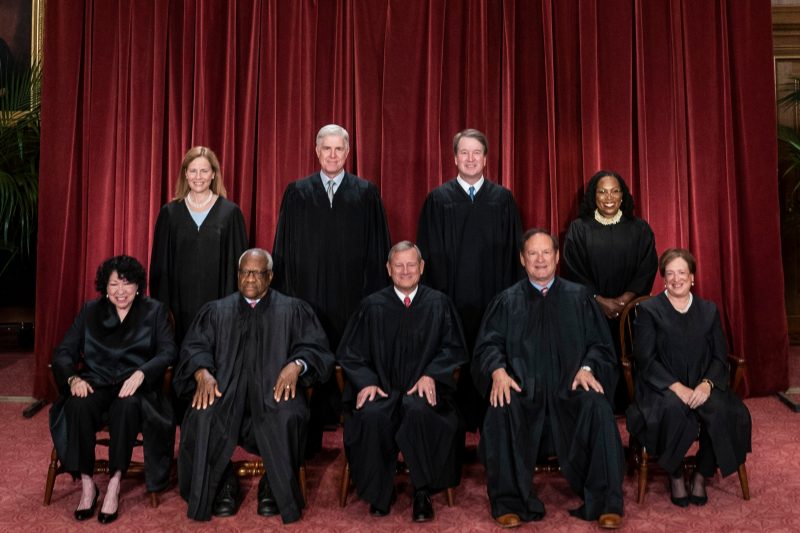The Senate Judiciary Committee in a letter Monday asked billionaire Harlan Crow to provide a full accounting of the free travel and other gifts he has made to Clarence Thomas or any other Supreme Court justices, marking an escalation of the powerful committee’s efforts to convince the court to adopt stricter ethical standards for itself.
Judiciary Committee Chairman Richard J. Durbin (D-Ill.) and the committee’s 10 other Democrats signed on to the letter asking Crow to provide an itemized list of gifts worth more than $415 that he’s made to Thomas, any other justice or any justice’s family member, as well as a full list of lodging, transportation, real estate transactions and admission to any private clubs Crow may have provided.
The Judiciary Committee is now the second Senate committee to target Crow after ProPublica reported that the Republican donor invited Thomas on pricey vacations, bought his mother’s house and provided Thomas’s grandnephew with private school tuition, most of which were not disclosed by the justice.
The Judiciary Committee also sent letters Monday to three companies associated with the Republican donor’s travels that facilitated the private resort, private jet and superyacht travel where Thomas has joined Crow, asking those companies to provide a list of other guests whose travel overlapped with Thomas’s or that of any other justice.
For example, the committee asked the company Topridge Holdings for a full list of guests who stayed at Camp Topridge — Crow’s private lakeside resort — while Thomas was there as a personal guest of Crow’s.
Supreme Court justices are required to disclose gifts of over $415, but the rules around gifts involving personal hospitality were murkier. The Judicial Conference, the federal courts’ policymaking body, recently changed disclosure rules to require justices and other federal judges to report more details of gifts, including free stays at hotels or hunting lodges, and clarified that a ride on a private jet, for example, must be reported.
“Regardless of the intentions behind these stays, if these gifts to Justice Thomas enabled those with interests before the Court to have private access to a Justice, it is a matter of significant public concern,” the senators wrote. The committee also asked for details about any stays that other Supreme Court justices may have had at the Adirondacks resort.
Crow has said he never attempted to influence Thomas’s decision-making on the court, and Thomas said he believed he had been following the court’s disclosure rules.
All 11 of the committee’s Democrats, including Sen. Dianne Feinstein (D-Calif.) — who on Tuesday announced she’s returning from a health-related months-long absence — signed the letters, and none of the committee’s Republicans joined.
Feinstein’s return could expand Durbin’s options if Crow ignores the request for information by the committee’s May 22 deadline. Her absence from the Judiciary Committee has meant the committee’s Democrats lacked the votes to subpoena anyone, given unanimous Republican opposition to the idea.
But in an interview with CNN on Sunday, Durbin did not rule out a subpoena, saying “everything is on the table.” He also said he was embarrassed for Thomas as news continued to drip out about his relationship with Crow and that he hoped Chief Justice John G. Roberts Jr. would move on his own to institute stronger ethical standards for the court.
“This is the Roberts court, and history is going to judge him by the decision he makes on this,” Durbin said. “He has the power to make the difference.”
Durbin last month asked Roberts to appear in front of the committee, but the chief justice declined the request, saying it would be inappropriate given the separation of powers. Roberts also included a “Statement on Ethics Principles and Practices” signed by all nine justices that reaffirmed the disclosure and other rules they abide by, saying they’ve done so for decades.
The letters to Crow and others are part of the committee’s efforts to craft legislation strengthening the ethical rules and standards that apply to Supreme Court justices. “The information gathered from these letters will help identify specific shortcomings in the ‘Statement on Ethics Principles and Practices’ that legislation needs to address,” committee spokeswoman Emily Hampsten said in a statement.
Such legislation would likely face a tough time gaining Republican support, however, as Republicans in Congress have rallied to Thomas’s side. Senate Minority Leader Mitch McConnell (R-Ky.) said Democrats want people to “gasp in horror” that Thomas vacations with his friends. Other Republicans have suggested Democrats are merely angry over the court’s conservative bent and recent decisions, including overturning the landmark Roe v. Wade decision that guaranteed the right to an abortion.
Yet the cascade of unflattering reports about Thomas and some other justices’ undisclosed potential conflicts of interest has fueled calls for ethics reform as polls suggest that Americans have declining trust in the institution. A conservative judicial activist, for example, paid Thomas’s wife, Virginia “Ginni” Thomas, tens of thousands of dollars for consulting work just over a decade ago, specifying that her name be left off billing paperwork, The Washington Post reported last week.
The reports have also put pressure on Durbin to take a more aggressive stance in pushing for court reform. Late last month, Senate Finance Chairman Ron Wyden (D-Ore.) asked Crow to inform his committee whether Crow reported the gifts to Thomas on his taxes. The senator also said he would “explore using other tools at the committee’s disposal” to obtain the information if Crow did not respond by May 8. A spokesman for Wyden said Crow’s attorney “refused to provide answers” to the committee in a response received late on Monday.
Fewer than 4 in 10 Americans said they have a “great deal” or “quite a lot” of confidence in the Supreme Court, according to an NPR-PBS NewsHour-Marist poll released late last month. In 2018, 59 percent said they had faith in the court.








